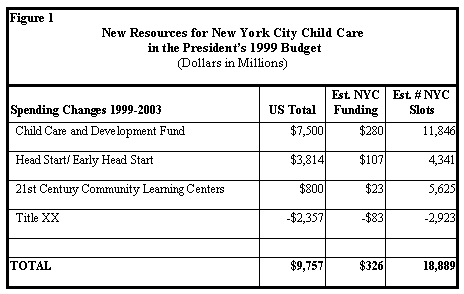
With 26,500 children currently on waiting lists for subsidized child care in New York City, parents, advocates, and officials are paying close attention to President Clinton's recently announced child care proposals. Included in his budget for 1999-2003 is increased funding for child care, early childhood development, and child care tax credits for families and businesses. In an analysis of these proposals requested by Public Advocate Mark Green, IBO estimates that about 18,900 child care slots could be added to NYC's system after five years. This figure could change, however, depending on decisions yet to be made.
The federal Child Care Development Fund (CCDF) is proposed to increase by $7.5 billion over five years. Available as matching funds, NYC would receive approximately $280 million by 2003 which would support 11,846 child care slots (at $6,500 per slot per year). The amount each state receives depends on the level of state spending on child care. If New York State uses new state funds to maximize federal matching dollars, the number of slots would double to 23,692. The President proposed to fund the expansion with anticipated proceeds from a settlement with the tobacco industry.
Nationally, Head Start funding would increase by $3.8 billion. This could mean an additional $107 million for NYC or approximately 4,341 slots by 2003. Also included are before- and after-school programs for children called "21st Century Learning Centers." Initiated this year in 400 schools, the proposed budget of $800 million would permit programs in 4,000 schools. If NYC won one of the program's competitive contracts, the city could receive about $23 million over five years, serving about 5,625 children each year.
The President's budget also proposes two tax credits to increase access to child care-one for families and one for businesses. Expansion of the Child and Dependent Care Tax Credit (DCTC) would be funded at $4.8 billion nationwide. In New York City, the DCTC would primarily benefit about 90,000 of the 170,000 families already taking the federal income tax credit-those with adjusted gross incomes below $59,000 per year. Their average credit would increase to $981, nearly double the $585 average credit under current law. The expansion would probably not induce large numbers of additional taxpayers to take the credit, however; in fact we estimate only about 9,000 new households would take the DCTC.
Another proposed tax credit funded at $478 million nationwide, would allow businesses a credit for the costs of on- or off-site child care as well as referral services and other programs. The potential impact of the credit is likely to be small. Little data exists regarding child care provided by NYC businesses but the information that does exist indicates that businesses do not offer much in the way of direct child care. The Department of Health reports that only 25 of the 184,740 businesses in NYC are currently licensed to directly provide child care for their employees.
Finally, the President's budget includes a decrease in Title XX funds, a traditional source of child care funding for NYC. If enacted, NYC stands to lose about $83 million, or about 2,923 child care slots from that proposal.
A net gain of 18,889 slots from the President's proposals would expand New York City's licensed and regulated child care system by one third. Such an increase could play a significant role in meeting the needs of New York City parents and children.
